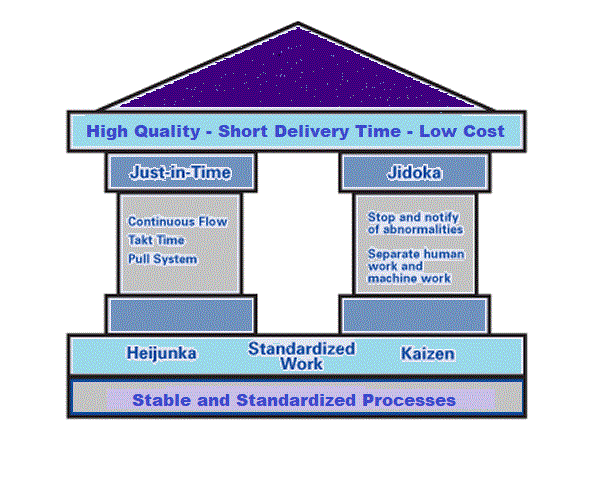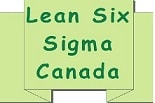Roots of the Toyota Production System
“The Toyota Production System (TPS), which is based on the philosophy of the complete elimination of all waste in pursuit of the most efficient methods, has roots tracing back to Sakichi Toyoda’s automatic loom. TPS has evolved through many years of trial and error to improve efficiency based on the Just-in-Time concept developed by Kiichiro Toyoda, the founder (and second president) of Toyota Motor Corporation.” – from Global Toyota

Among a variety of models that depict the Toyota Production System, the one presented in the shape of a house with two pillars, Just-in-Time and Jidoka, is the most relevant.
Just-in-Time as defined by Toyota is making only what is needed, when is needs and in the amount needed. By eliminating waste (muda, mura, muri) and producing quality products you can fulfill an order as quickly as possible. In other words, each process produces only what is needed for the next process in a continuous flow.
Jidoka (automation with a human touch) as defined by Toyota, means that a machine must come to a safe stop whenever an abnormality occurs. Achieving jidoka, requires building and improving systems by hand until they are reliable and safe.
At the foundation of the TPS house model are Heijunka, Standardized Work and Kaizen. Work is standardized if repeated in exactly the same manner from person to person and task to task and Kaizen means constant, incremental small-scale progress or improvement. How about Heijunka, what does it mean? Heijunka means smoothing and leveling out the work schedule, by eliminating “mura” which is fundamental to eliminating “muri” and “muda”. Toyota system is very flexible, it is not a built-to-order system. It is a “change-to-order” system.
In summary, Toyota Production System is a model on how to achieve both customers and employees satisfaction, through respect and teamwork, on a basis of mutual trust between management and employees. Since late 80’s many companies around the world have implemented their version of TPS, called Lean manufacturing, which later evolved into Lean Enterprise.
Watch John Shook, the CEO of Lean Enterprise Institute (LEI), explaining the Lean Transformation Model.
Also, you can watch the Lean Transformation Framework Animated.
